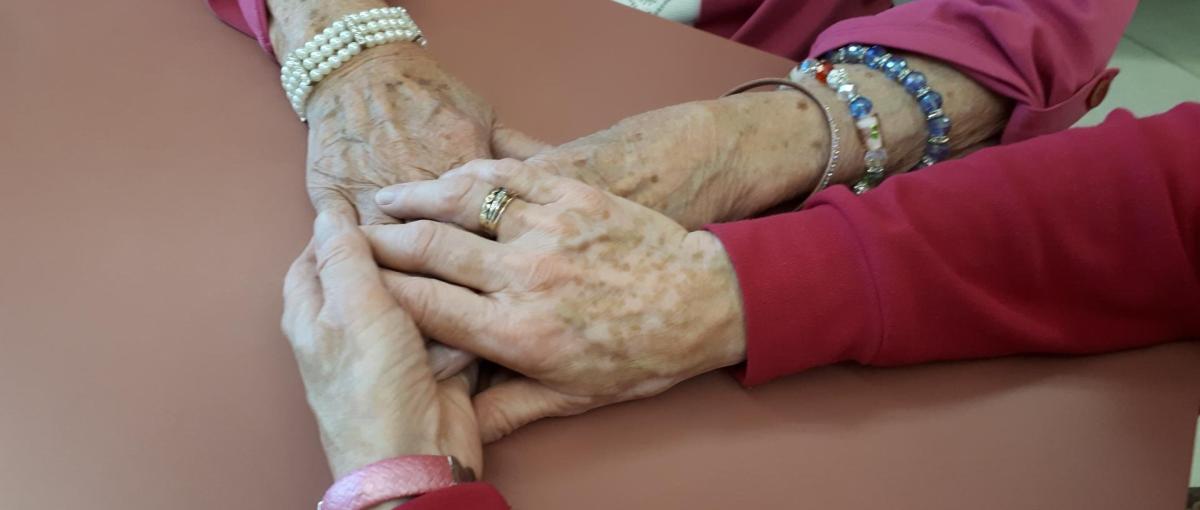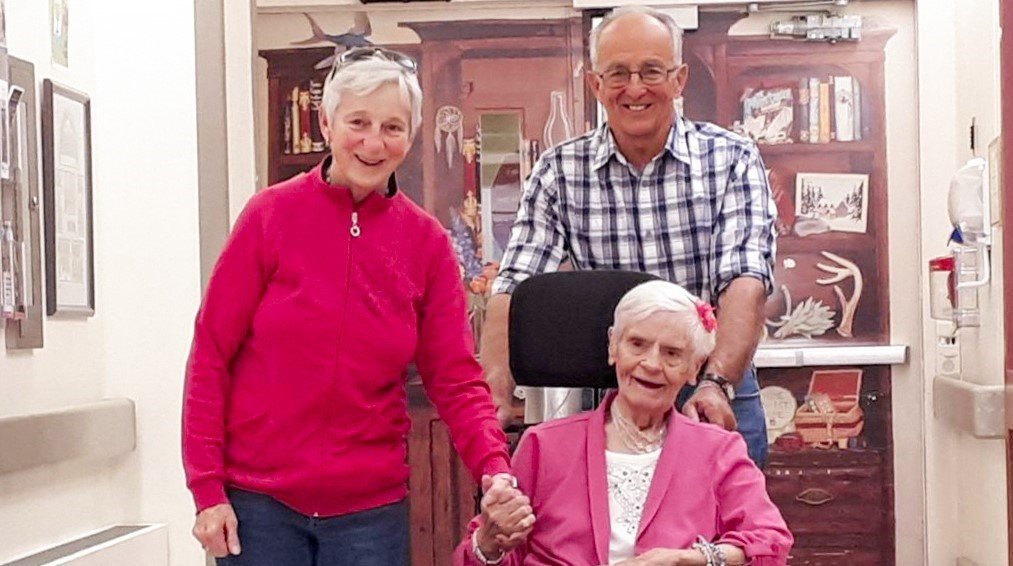Who's caring for the caregiver?
More and more Canadians are providing care for family members

October 21, 2019
By Marguerite Watson, Senior Communications Advisor, Covenant Health
When Ann and Pat Kamenka chose to become caregivers for Ann's parents, Mary and Tony Russell, they didn't know how difficult it would be.
"I had no idea, and I don't think anyone knows. It's almost a full-time job," says Ann, 65.
"And we didn't anticipate the length of the commitment we were making," says Pat, 68.
Ann and Pat have been caregivers for Mary, 95, and Tony, 97, since 2001, when they moved the couple into a house next door to their home in Canmore. At the time, Mary and Tony were facing health challenges but were still fairly independent. Over the years, that changed as Mary developed dementia, Tony was treated for cancer and they both became less and less able to care for themselves.

In 2017, Mary became a resident on the long-term care unit at St. Martha's Place in Banff, and Tony moved to the Canmore Seniors Lodge. Ann and Pat remain very active caregivers, visiting Mary and Tony two or three times a week and taking them to appointments and the bank.
Ann and Pat's story is becoming increasingly common and will only become more so as the Canadian population ages and life expectancy grows. Currently, nearly three in 10 Canadians in their 40s and 50s are providing care, largely for a parent or in-law, and another four in 10 expect to be caregivers in the future, according to a 2019 Angus Reid study. For many in this age group, caregiving also includes raising children under 15.
The stress that can come from caring for others poses the question "Who's taking care of caregivers?"
"Caregivers can have a whole continuum of experiences, from being fairly resilient, resourceful and able to find the help they need to feeling helpless and hopeless and all the shades of grey in between," says Psychologist Cheryl Nekolaichuk, who works with patients and families on the Palliative Care unit at the Grey Nuns Community Hospital.
Caregivers may also start out being resourceful but end up feeling drained as years of providing primary care take a physical, emotional and financial toll, says Kim Crowe, Social Worker, Grey Nuns Palliative Care unit. They can become socially isolated because of their experience and believe that no one understands what they're going through. And some caregivers, for example, those who see their loved one undergo a traumatic surgery, may have symptoms of post-traumatic stress disorder, such as a numbing effect, says Cheryl.
There's also often a change in roles between caregivers and those they care for. "Caregivers become responsible for things they weren't responsible for before, which can cause added stress," says Sandy Ayre, Occupational Therapist, Grey Nuns Palliative Care unit.
Ann and Pat know what it's like to feel depleted by the responsibilities of caregiving. "We thought we were going to lose it until we finally got my parents in care," Ann says. "We were very burnt out."
Along with looking after Mary's and Tony's many health issues, Ann and Pat were helping with meals, shopping, banking and all the other aspects of daily living. The situation led to Ann quitting work. She and Pat also dropped out of groups they belonged to and gave up activities like bike riding, hiking and volunteering.
"We totally lost our life," says Ann. "And I felt we were neglecting our own health in order to help my parents."
Pat says they also faced lack of understanding from people who hadn't experienced the stress of caregiving and expected them to do more. "You say [to yourself] that you can't do any more than what you're doing, but then you think, 'Am I doing enough? There's got to be more.' And you feel worse when there isn't. It's a spiral that keeps going down," says Pat.
While the financial and emotional strain they experienced was hard on their relationship, they were able to talk through their difficulties and come to resolutions, Pat says. Ann also participated in behaviour modification sessions to learn how to manage stress. And the two attended a local support group for caregivers, where they could share their story, get guidance and exchange ideas and coping strategies.
"Whether or not people can reach out and get the support they need is, I think, the deciding factor to their ability to follow through," says Cheryl. Finding ways to set boundaries, doing something creative and pursuing hobbies or interests are also key coping mechanisms.
With Mary and Tony now in care, Ann and Pat feel that they themselves are "on the way to recovery." Their caregiving to-do list is still long, but they're working on spending time with their children, grandchildren and friends and looking after their own health. They walk every day, try to eat well and ride their bikes when possible.
Though it's difficult, caregiving can be an experience that people, in the end, would not change, says Kim. "It might have been a physical burden, but they're happy they were able to do it."
That has been true for Ann and Pat. "It was definitely our choice," says Ann. "We felt we had to do what we could."
Pat agrees. "We had to be certain Ann's parents were well cared for," he says.